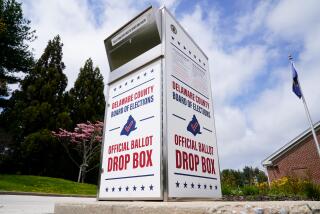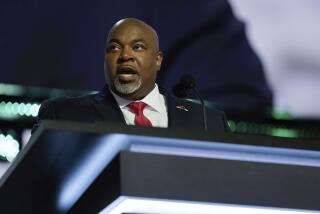There’s no escaping a hurricane of campaign ads in Florida
Robert Cardwell voted early in Florida’s Republican primary, but that doesn’t mean the campaigns have stopped trying to win his vote.
Campaign advertisements blare at him from the television, pop up on the Internet, make their way onto his answering machine.
“Some of them are pretty annoying,” said Cardwell, 75, a retired airline pilot. “I try not to turn on the TV during the day.”
Thanks in part to “super PACs,” independent political organizations that since 2010 have been allowed to raise unlimited funds from corporations and individuals, Florida’s airwaves have been swamped with advertisements leading up to Tuesday’s primary.
Mitt Romney’s campaign had spent $6.9 million to air commercials on the state’s broadcast and cable channels as of Monday morning, while Restore Our Future, the super PAC supporting Romney, had spent $8.5 million, according to a campaign source familiar with the ad buys. Newt Gingrich’s campaign spent $1.6 million over the same time period, and Winning Our Future, the pro-Gingrich super PAC, spent $2.2 million.
There’s a gravelly voice telling Cardwell and other Floridians that “while Florida families lost everything in the housing crisis, Newt Gingrich cashed in.” And there’s another voice — a serious-sounding woman this time — telling them that “Romneycare sent costs spiraling out of control, hiking premiums, squeezing household budgets.” Even former NBC anchor Tom Brokaw has gotten air time; the Romney campaign has a commercial that consists solely of footage from a 1990s newscast anchored by Brokaw in which he declared that Gingrich had been sanctioned by peers after an ethics investigation.
The ads can’t be avoided by just turning off the news. Jackie Renshaw, a retiree, sees ads during the “Ellen” show and during “Live! With Kelly.” Trish Gibson sees them during her soap operas. Manuel Mari saw one during “Family Guy,” and, appropriately, “Shark Tank.” Advertisements are on the radio, in the mail and online. Even President Obama has started advertising on the Web here, getting an early start on winning the hearts and minds in this swing state.
Advertising of such ferocity is normal in the fall before a general election, but it is “over the top for a primary,” said Susan MacManus, a political science professor at the University of South Florida. The ads are so frequent, she said, because Gingrich’s South Carolina victory threw a wrench into Romney’s nomination march, heightening the importance of winning Florida.
“All of sudden, after South Carolina, in a snap of the fingers, the airwaves became filled with creative and dastardly behavior,” she said.
In Florida, interest groups supporting Romney bought 6,942 ad spots between the beginning of the year and January 25 — four days after South Carolina — in addition to the 5,826 paid for by Romney’s campaign, according to data from Kantar Media/CMAG and analyzed by the Wesleyan Media Project. By contrast, Gingrich had 14 spots over the same time period, with an additional 196 paid for by his super PAC.
The prevalence of ads since then shows that television remains the dominant persuasive force, says Mike MacLean, the general sales manager at WFTS, the ABC affiliate in Tampa.
“When it’s game, set, match for these politicians, broadcast is the medium they turn to,” he said.
Television seems an especially adept way to reach people such as John O’Connell, a retiree from New Jersey who spends his days lounging around his apartment, taking walks and watching ball on TV. No matter that he’s a Democrat and can’t vote in this primary. “The ads keep on repeating, repeating, repeating,” he said.
“It’s like watching a rerun ... as far as I’m concerned. I think they’re meant for retired people like me.”
If people like O’Connell hope local stations will fill up with nonpolitical ads, that’s not likely to happen. Federal law stipulates that stations give candidates access, and the lowest rates. Candidates seem to be reaching an older crowd with their commercials on broadcast TV, but that may be their plan — 70% of those 65 and older turned out to vote in 2008, according to AARP.
“Whenever the television is on, you can see them. Whenever you’re listening to the radio, going to work, when you come home, you see them,” said Joan Childs, 72, a psychotherapist in Hallandale Beach.
It might be enough to make you feel bad for people like Jose Mari, 46, who stands behind a counter in his father’s liquor store, some days from 9 a.m. until midnight, staring up at the flat-screen TV five feet away that bombards him with ads.
“I try to tune them out,” he said, glancing over to the TV, located above long lines of wine bottles.
That apparently is not possible for his son Miguel, 11, who is sitting behind the counter with his father on a slow Saturday. He’s years away from voting. But this year’s primary has already imprinted his mind with a slogan of democracy.
“I’m Mitt Romney and I approve this message,” he said, unprompted. Then he turned his eyes back to the TV.
Semuels reported from Miami Beach and Gold from Washington.
More to Read
Sign up for Essential California
The most important California stories and recommendations in your inbox every morning.
You may occasionally receive promotional content from the Los Angeles Times.











